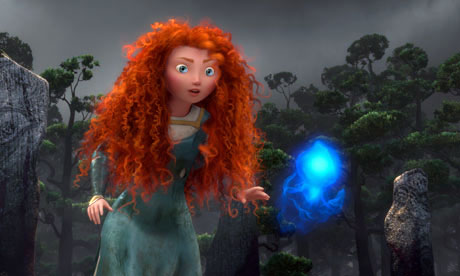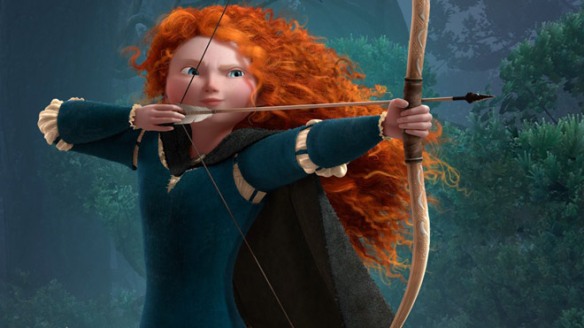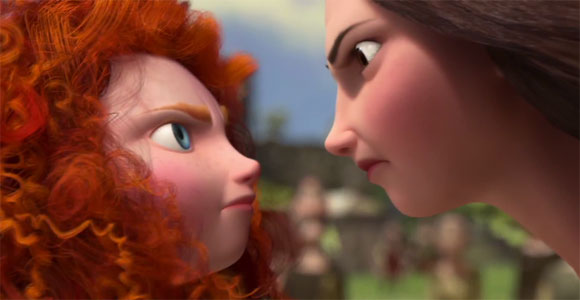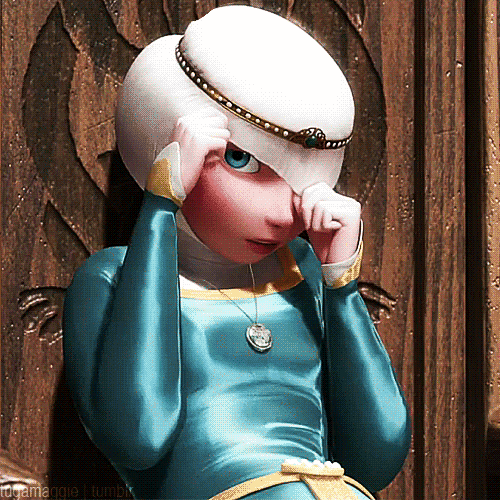I graded this movie as an A+ in visuals by the wonderful, hard-working animators at Pixar, and A+ for music in the score by Patrick Doyle, but only a B for story. A “B” isn’t really that bad, (and still above average), but it’s just not nearly as good as I’ve come to expect from a Pixar film.
The tagline for Brave was “change your fate,” and I’m sure if you saw the ubiquitous trailer this summer, you heard the line, “if ya had the chance to change yer fate, wouldja?” (spoken in a Scottish accent), but I wouldn’t really say that’s the main theme in this movie, –I would say it’s about the consequences our actions can have, and the importance of reconciliation. (It’s also not really about being brave, so neither the title nor the tagline are terribly appropriate).
Scottish princess Merida of the Dunbraugh clan is “destined” to marry the heir of one of her father’s allied clans. Merida’s mother is frustrated that her daughter doesn’t seem serious about applying any of her lessons in ladylike behavior and queenly decorum, and the heroine is equally frustrated that her mother doesn’t appreciate her interests and skills in horse-riding and archery and her disinterest in an arranged marriage. Mother and daughter share a simultaneous line in split-screen about wanting the other to listen to her point of view.
The Queen does put an unbearable pressure on Merida when she tells her, “above all, a princes strives to be perfect,” as if that were attainable, and really doesn’t seem to understand her daughters anxiety and dread of betrothal with a throwaway “Oh, Merida, it’s marriage, it’s not the end of the world!” For her part, Merida spits a very hurtful line at her mother, shouting, “I’ll never be like you! I’d rather die than be like you!” as she slashes the family tapestry that her mother has been sewing all her life in two. The Queen responds by throwing Merida’s beloved bow into the fire. Both are deeply, justifiably hurt.
Merida runs away and comes across a witch, from whom she buys “a spell to change my mum. That’ll change my fate.” Surprise surprise, the spell doesn’t quite do what Merida thought it would. **SPOILER ALERT** It transforms her mother’s body into that of a bear.

The “will o’ the wisp”s are supposed to be “magic” or spiritual guides, but they really function as plot devices leading Merida to the place where the next scene happens.
Merida and the bear-Queen return to the witch for help reversing the spell, but she’s gone, having left behind only a potion-operated answering service, (that is supposed to be funny but annoyed me because it was ridiculously anachronistic to the story setting.) They learn that if it is not reversed before “the second sunrise,” the spell will be permanent and the Queen will become a wild bear. The formula for reversing the spell is:
Fate be changed,
look inside,
Mend the bond
torn by pride.
Merida and the bear-Queen interpret the witch’s instructions to mean that they must literally sew the family tapestry, torn apart in anger, back together. This involves sneaking the bear-Queen back into the castle and past the roomful of gathered clansmen, and Merida has to utilize the skills in diplomacy and decorum (to distract the clansmen) and domesticity (to sew up the tapestry) that her mother was always trying to impress upon her. (Earlier I guess we were supposed to think that the Queen had also come to realize the validity of Merida’s perspective, because as a bear she was quite un-ladylike and ate raw fish. I’m not sure that being physically forced by magical coercion to behave differently than you normally would counts as empathizing with someone else, but then I wasn’t convinced that the Queen didn’t really understand her daughter’s point of view to begin with, just that she didn’t place much importance on it.)
As you could probably guess, mending the tapestry does not reverse the spell, because the “bond torn by pride” was between mother and daughter. I was fully expecting Merida to have to utter the “magic” words, “I’m sorry”, but instead the movie went with the cliche and less powerful (in this situation) “I love you.” Really, Pixar?! This isn’t Beauty and the Beast! Love and forgiveness overlap, for sure, but I don’t think they are always mutually interchangeable. Merida to shouted to her mother’s face that she would rather die than be like her, she ripped apart the project her mother had spent years working on, and she tricked her mother into eating a bewitched pie to “change her.” Even if she didn’t realize it would turn her into a bear, she was purposefully manipulative, underhanded, and selfish. The appropriate thing for her to say is “I’m sorry”! (This is one of the reasons I only graded the story as a B).
Looking at this positively, I guess it could be a good illustration of two scripture passages on anger. The hurtful words and actions that the Queen and Princess exchange are spoken in anger–all the trouble and hurt feelings might have been avoided if they two had tried to apply James 1:19 to their relationship, which says:
My dear brothers, take note of this: Everyone should be quick to listen, slow to speak and slow to become angry.
The other verse this storyline made me think of was Ephesians 4:26-27:
In your anger do not sin: Do not let the sun go down while you are still angry, and do not give the devil a foothold.
Don’t let the sun go down (or the second sunrise come up) on your anger, or else your mother might be permanently transformed into a bear. That’s the Brave version of Ephesians 4:26. I should add that, while the Bible doesn’t place a two-sunrise time limit on reconciliation, it does urge a quick resolution to interpersonal conflict. Jesus tells us in Matthew 5:23-24 that it is more important to make our human relationships right than to observe religious rituals:
Therefore, if you are offering your gift at the altar and there remember that your brother or sister has something against you, leave your gift there in front of the altar. First go and be reconciled to them; then come and offer your gift.
Despite the disappointingly weak and predictable storyline, the film is well worth watching just for the stunningly beautiful animation. Just look at the details in the gif below, like her pinky finger clenching, the light on the fabric moving, her ribcage expanding and contracting as she breathes. And this shot doesn’t even include her hair, which is incredible–I read that Pixar developed new software in the process of making this movie, just to animate Merida’s hair!
In conclusion, this is a good film, it’s just too bad it’s not the great one I was hoping for. The message of understanding another’s perspective and reconciling broken relationships is good, and it is one of those rare princess films where the girl has her own plot lines independent of any romantic interests. (One little girl, after seeing Brave in the theater, reported that Merida doesn’t end up with a prince because “none of them were very handsome.” -thanks EBR).



